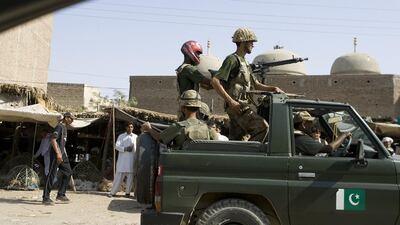Earlier this month, the Pakistani military announced that it had finalised preparations for an assault on Shawal Valley, a tribal area of North Waziristan with peaks, slopes and a maze of ravines.
Its topography made the Shawal Valley a natural fortress for the Taliban and, after a year of counterterrorism operations, it’s the last sizeable chunk of turf controlled by the insurgents and their Al Qaeda cohorts.
The planned assault on the Valley means that after more than a decade of civil war, which has cost 55,000 lives, Pakistan is on the verge of securing the tribal areas that form its border with eastern Afghanistan.
Six years ago, the international community was fretting over whether Pakistan would survive the existential threat posed by the Taliban. The group was in complete control of the tribal areas and had expanded its writ into the settled province of Khyber-Pakhtunkhwa by seizing picturesque Swat.
Despite the pretence of a peace agreement with the government, the Taliban continued to push westward and, clearly, were headed for Islamabad.
The West baulked at the prospect of Pakistan’s nuclear arsenal falling into terrorist hands. For what seemed like ages, the government lacked the stomach for a fight. Even though I was confident that the military would not let things go beyond the point of no return, a brief period of Taliban occupation seemed a very real possibility. So I sat down with my family and explained that the Taliban might temporarily occupy some of Islamabad's suburban areas, such as the one in which we lived. I assured them that they would be safe if they stayed confined to the house because my ex-militant fixers had secured assurances from the Taliban. It was hardly the sort of conversation that any father would want to have with his children.
Now that the military has announced its plans for Shawal Valley, the obvious question is: how did the authorities let things get so far? Sadly, the reason is obvious: the Pakistani state's long history of collusion with militants predates even the 1980s Soviet occupation of Afghanistan.
To advance a twisted vision of “strategic depth” against its foes, the Pakistani state made up for the lack of conventional resources by recruiting youngsters into militant proxy organisations. They were often recruited from state schools, including one in the Thar Desert where I once worked as a volunteer teacher. That hideous exercise was halted in 2002, albeit under US pressure.
Subsequent events have demonstrated that those complicit in using militant religiosity to pursue strategic and domestic political ends can fall for their own propaganda. In 1998, the army’s in-house publication even criticised its chief of staff for poor religious observance.
Therefore, it was hardly surprising that the military was slow to respond to the threat posed by jihadists whose leaders had been radicalised at seminaries run by proxies of the state, trained alongside newly commissioned officers at camps a stone’s throw from Islamabad and who had fought shoulder-to-shoulder with regular troops in the 1999 Kargil war with India.
As senior counter-terrorism officials of the military’s Inter-Services Intelligence directorate have since told me, there was simply no desire to fight and kill “fellow Muslims” despite their predilection to kill other Muslims.
Even more ironically, the Pakistani military knew about the rising levels of home-grown radicalism as far back as 1990, when it formed a task force of three colonels to recommend measures to prevent the Afghan jihad from becoming a domestic problem.
They had prescribed decisive action, but none was taken and those officers — who went on to become some of the army's top commanders — were the ones who launched the 2009 counterterrorism campaign that’s now about to deprive the Taliban of its last safe haven in Pakistan's tribal areas.
Tom Hussain is a journalist and political analyst based in Islamabad
On Twitter: @tomthehack

